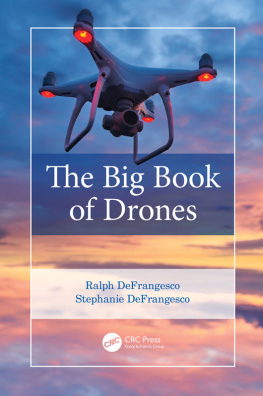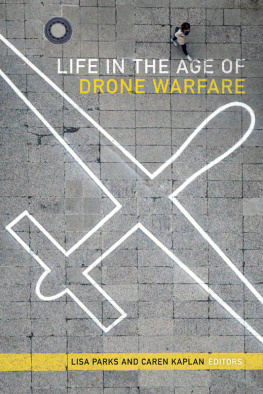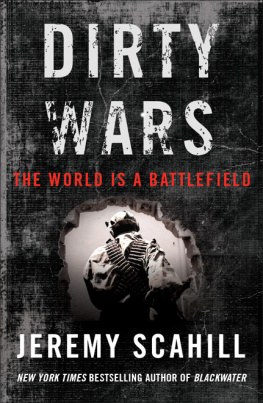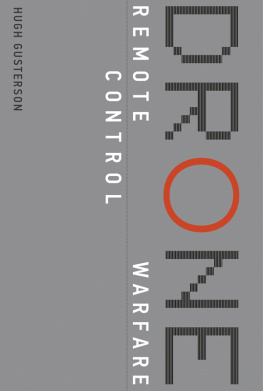Thank you for downloading this Simon & Schuster eBook.
Join our mailing list and get updates on new releases, deals, bonus content and other great books from Simon & Schuster.
C LICK H ERE T O S IGN U P
or visit us online to sign up at
eBookNews.SimonandSchuster.com
We hope you enjoyed reading this Simon & Schuster eBook.
Join our mailing list and get updates on new releases, deals, bonus content and other great books from Simon & Schuster.
C LICK H ERE T O S IGN U P
or visit us online to sign up at
eBookNews.SimonandSchuster.com
For those who speak out clearly and pay up personally.
PREFACE
BETSY REED
The story of The Drone Papers, on which this book is based, began, as national security exposs often do, with a reporter and a source. Jeremy Scahill, whose previous books penetrated the secret world of government security contractors and special ops, was approached by a whistleblower from within the U.S. intelligence community whose conscience demanded that he reveal to the public the true nature of the covert war being waged in the name of their security.
What followed was a painstaking process of reporting and analysis by a team of reporters, researchers, editors, and designers at The Intercept , the digital investigative magazine that Scahill founded with Glenn Greenwald and Laura Poitras in the wake of NSA whistleblower Edward Snowdens massive leak of documents exposing the extent of domestic surveillance.
On October 15, 2015, The Intercept published The Drone Papers, a comprehensive investigation based on a new set of documents, detailing the U.S. militarys drone wars in Yemen, Somalia, and Afghanistan. Providing an unprecedented look at the militarys drone-based assassination program, the series revealed that drone strikes kill far greater numbers of people than those on kill listsin one Afghan campaign 90 percent of those killed were not the intended targetand that the military classifies unknown persons, often innocent bystanders, as enemies killed in action.
In meticulously reported stories accompanied by vivid data visualizations, The Drone Papers illuminated the culture that celebrates targeted kills with terms like jackpot and touchdown. Exposing for the first time an official kill chain leading all the way to the president, The Intercept s reporting paints a careful yet devastating portrait of how the drone campaign harms U.S. intelligence and exacerbates the very threat the war on terror seeks to overcome.
The Drone Papers earned extensive broadcast coverage and was the focus of hundreds of follow-up stories worldwide. Most major newspapers covered the story, many declaring the emergence of a new Edward Snowden. Published the same day President Obama declared that U.S. troops would remain in Afghanistan, The Drone Papers framed the reception of that announcement and sparked debate about Americas role in the world.
The Assassination Complex presents the original articles from The Drone Papers along with additional reporting from The Intercept on the process by which the U.S. government creates its watchlists, the role of the National Security Agency in the assassination program, and the inevitable use of military surveillance technology in domestic policing. This body of reporting provides an unparalleled glimpse into the shadowy world of extrajudicial assassination that promises to be Barack Obamas most troubling legacy.
FOREWORD: ELECTED BY CIRCUMSTANCE
EDWARD SNOWDEN
Ive been waiting forty years for someone like you. Those were the first words Daniel Ellsberg spoke to me when we met last year. Dan and I felt an immediate kinship; we both knew what it meant to risk so muchand to be irrevocably changedby revealing secret truths.
One of the challenges of being a whistleblower is living with the knowledge that people continue to sit, just as you did, at those desks, in that unit, throughout the agency, who see what you saw and comply in silence, without resistance or complaint. They learn to live not just with untruths but with unnecessary untruths, dangerous untruths, corrosive untruths. It is a double tragedy: what begins as a survival strategy ends with the compromise of the human being it sought to preserve and the diminishing of the democracy meant to justify the sacrifice.
But unlike Dan Ellsberg, I didnt have to wait forty years to witness other citizens breaking that silence with documents. Ellsberg gave the Pentagon Papers to the New York Times and other newspapers in 1971; Chelsea Manning provided the Iraq and Afghan War logs and the Cablegate materials to WikiLeaks in 2010. I came forward in 2013. Now here we are in 2015, and another person of courage and conscience has made available the set of extraordinary documents that are published here.
We are witnessing a compression of the working period in which bad policy shelters in the shadows, the time frame in which unconstitutional activities can continue before they are exposed by acts of conscience. And this temporal compression has a significance beyond the immediate headlines; it permits the people of this country to learn about critical government actions, not as part of the historical record but in a way that allows direct action through votingin other words, in a way that empowers an informed citizenry to defend the democracy that state secrets are nominally intended to support. When I see individuals who are able to bring information forward, it gives me hope that we wont always be required to curtail the illegal activities of our government as if it were a constant task, to uproot official lawbreaking as routinely as we mow the grass. (Interestingly enough, that is how some have begun to describe remote killing operations, as cutting the grass.)
A single act of whistleblowing doesnt change the reality that there are significant portions of the government that operate below the waterline, beneath the visibility of the public. Those secret activities will continue, despite reforms. But those who perform these actions now have to live with the fear that if they engage in activities contrary to the spirit of societyif even a single citizen is catalyzed to halt the machinery of that injusticethey might still be held to account. The thread by which good governance hangs is this equality before the law, for the only fear of the man who turns the gears is that he may find himself upon them.
Hope lies beyond, when we move from extraordinary acts of revelation to a collective culture of accountability within the intelligence community. Here we will have taken a meaningful step toward solving a problem that has existed for as long as our government.
Not all leaks are alike, nor are their makers. Gen. David Petraeus, for instance, provided his illicit lover and favorable biographer information so secret it defied classification, including the names of covert operatives and the presidents private thoughts on matters of strategic concern. Petraeus was not charged with a felony, as the Justice Department had initially recommended, but was instead permitted to plead guilty to a misdemeanor. Had an enlisted soldier of modest rank pulled out a stack of highly classified notebooks and handed them to his girlfriend to secure so much as a smile, hed be looking at many decades in prison, not a pile of character references from a Whos Who of the Deep State.
There are authorized leaks and also permitted disclosures. It is rare for senior administration officials to explicitly ask a subordinate to leak a CIA officers name to retaliate against her husband, as appears to have been the case with Valerie Plame. It is equally rare for a month to go by in which some senior official does not disclose some protected information that is beneficial to the political efforts of the parties but clearly damaging to national security under the definitions of our law.
Next page













